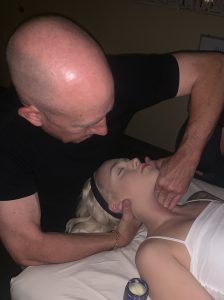Medical Research on Efficacy of
Massage & Bodywork Therapy
 Modern medical research has provided valuable insights into the effectiveness of massage and bodywork therapy for various health conditions. While the evidence is still evolving, several studies have demonstrated promising results in certain areas.
Modern medical research has provided valuable insights into the effectiveness of massage and bodywork therapy for various health conditions. While the evidence is still evolving, several studies have demonstrated promising results in certain areas.
It is openly admitted that much of the medical “evidence” is not fully accepted by the orthodox medical establishment, there is no doubt that many Clients of many massage & bodywork therapists experience great relief from their symptoms.
Also, orthodox medical research tends to be done on remedies that are easily subject to double-blind studies. Yet there are so many variables in massage & bodywork, they are not readily subject to precise evaluation. There is too much subjectivity on the part of both the Client and Therapist.
As well, the variability of skill and knowledge of any individual therapist varies widely. So very often, when a massage technique is being evaluated, what is REALLY being tested is the quality & training of the therapist.
Therefore, it pays to attend a school with a long-standing reputation for graduating the most highly trained and qualified therapists.
The Curriculum at NCSAB was developed and implemented by leaders in the massage & bodywork therapy field, Kyle C. Wright, LMBT and David Phillips, LMBT. Teaching of the program is still led by David Phillips and his team of highly qualified instructors.

Kyle C. Wright, LMBT

David Phillips, LMBT
Here Is A Review / Summary of Some of the Available
Medical Research on Massage & Bodywork Therapy:
Pain Management
Massage therapy has shown potential benefits for managing various types of pain:
Low Back Pain
Multiple studies have found weak to moderate evidence supporting the use of massage for low back pain[4]. Clinical guidelines issued by the American College of Physicians recommend massage as an initial treatment option for chronic low back pain[4].
Neck Pain
A 2016 review of four randomized controlled trials found that massage therapy may provide short-term benefits for neck pain[4]. However, the effectiveness of massage for neck pain remains uncertain, and more research is needed[4].
Osteoarthritis
Some studies suggest that massage may have short-term benefits in relieving knee pain associated with osteoarthritis[4]. A 2017 systematic review found low- to moderate-quality evidence that massage therapy is superior to non-active therapies in reducing pain and improving functional outcomes for arthritis patients[4].
Fibromyalgia
Research indicates that massage therapy may be helpful for some fibromyalgia symptoms:
- A 2014 systematic review and meta-analysis concluded that massage therapy, if continued for at least 5 weeks, improved pain, anxiety, and depression in people with fibromyalgia[4].
- A 2015 systematic review found that most styles of massage had beneficial effects on the quality of life in fibromyalgia patients, with the exception of Swedish massage[4].
Cancer-Related Symptoms
Some studies have explored the potential benefits of massage for cancer patients:
- A 2016 Cochrane review found some studies suggesting that massage with or without aromatherapy may help relieve pain and anxiety in people with cancer[4]. However, the quality of evidence was very low, and results were not consistent.
- Another 2016 systematic review and meta-analysis suggested weak recommendations for massage therapy in the treatment of pain, fatigue, and anxiety in cancer patients[4].
Immune System and Circulatory Benefits
Massage therapy has been associated with potential benefits for the immune and circulatory systems:
- Studies have shown that massage therapy can stimulate the circulatory system, improving blood and lymph flow[1].
- Massage may help boost immunity by stimulating the lymphatic system, which is one of the body’s waste-clearing mechanisms[1]
Hormonal Effects
Research has indicated that massage therapy can influence hormone levels:
- Studies have shown that massage therapy can lower cortisol levels and increase dopamine and serotonin levels[1].
Massage may also help lower excitatory hormones like norepinephrine and epinephrine, potentially reducing feelings of anxiety[1].
Sleep Improvement
Massage therapy may have positive effects on Sleep. By stimulating the parasympathetic nervous system, massage can help promote relaxation and potentially improve sleep quality[1].
While these findings are promising, it’s important to note that the overall quality of evidence for many massage therapy applications remains low to moderate. A 2024 study published in JAMA Network Open found that despite numerous clinical trials and systematic reviews, there were few conclusions regarding massage therapy that had greater than low certainty of evidence[5].
More rigorous research is needed to establish the effectiveness of massage therapy for various conditions definitively. Future studies should focus on improving methodological quality, using appropriate comparators, and conducting longer follow-up periods to provide more conclusive evidence on the benefits of massage and bodywork therapy.
Citations:
[1] https://theanatomyofwellness.com/6-surprising-benefits-of-massage-therapy/Medical References from 6 Surprising Benefits and Healing the Adrenal System:
The Effectiveness of Massage Therapy:
1. Field T, Hernandez-Reif M, Diego M, Schanberg S, Kuhn C., Cortisol decreases and serotonin and dopamine increase following massage therapy. Touch Research Institutes, University of Miami School of Medicine, Miami, Florida , 2005.
2. Field T, Schanberg S, Kuhn C, Field T, Fierro K, Henteleff T, Mueller C, Yando R, Shaw S, Burman I., Bulimic adolescents benefit from massage therapy. Touch Research Institutes, University of Miami School of Medicine, Miami, Florida , 1998.
[2] https://www.rmtedu.com/blog/a-summary-of-massage-therapy-research-august-2024This is a very informative and important article. It references numerous studies and papers on the medical research of massage & bodywork therapy.
[3] https://massagetherapyfoundation.org/massage-research/This page links to numerous research papers on the effects of massage & bodywork therapy. Here is a short video summarizing the work of the Massage Therapy Foundation:
[4] https://www.nccih.nih.gov/health/providers/digest/massage-therapy-for-health-science
Osteoarthritis: “A 2013 review of two randomized controlled trials found positive short-term (less than 6 months) effects in the form of reduced pain and improved self-reported physical functioning. Results of a 2006 randomized controlled trial of 68 adults with OA of the knee who received standard Swedish massage over 8 weeks demonstrated statistically significant improvements in pain and physical function.”
Fibromyalgia: “A 2015 systematic review and meta-analysis of 10 studies (478 total participants) compared the effects of different kinds of massage therapy and found that most styles of massage had beneficial effects on the quality of life in fibromyalgia.”
Many other research references on this page.
[5] https://www.nccih.nih.gov/health/massage-therapy-what-you-need-to-know [6] https://academic.oup.com/painmedicine/article/17/7/1353/2223191From Abstract: “Based on the evidence, massage therapy, compared to no treatment, should be strongly recommended as a pain management option.”
